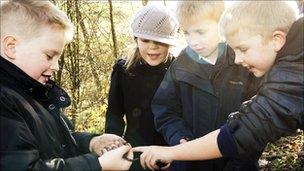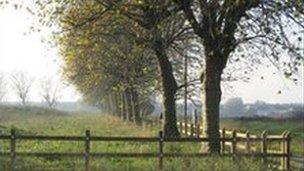Learning from worms, mud and sticks
- Published

Playing with worms
Children climbing trees and getting covered in mud romping by streams used to be common sights across the country.
Natural or "free" play was greatly encouraged, and many children would play happily without adults for hours.
But fears of "stranger danger", a growing love affair with computer technology, busier roads and fewer wild environments mean children are more likely to stay indoors.
Activities have become more organised and supervised, but some say this lack of independence and freedom could be damaging children's development, as well as contributing to increasing obesity and inactivity levels.
Vital skills
And there are fears the problem could become worse with the announcement last month that the government is to freeze grants to councils which were aimed at building or improving community play areas.
Drama therapist Alida Gersie, who uses the outdoors in her work with deprived and problem youngsters, said unfettered play is vital for development.
"It is fundamental for the child's well-being and also for them as an adult to be innovative, adaptable and creative," she said.
"In free play if you cannot predict how you are going to be you also cannot predict how others are going to behave and you need to find new solutions to new situations.
"Humanity has developed with a need for this.
"And when children do not get that overall development their development is curtailed.
"If a bunch of kids go to play together the benefits are a reliance on one's mates, a need to problem solve and social autonomy which is fundamental to society.
"In free play all your senses are activated and it is such a pity that children are losing it."
"I remember taking a bunch of children from a very deprived inner-city housing estate on a camping trip," she added.
"In the evening we took these very tough boys on a walk. At the last 100 metres I asked if they wanted to walk home alone to have that experience. Two boys, aged 16-17, burst into tears - that is how frightened they were of what was not even dark."
'Easy to criticise'
Dougie MacTaggert, a woodland ranger for Forestry Commission which works with The Land Trust, said there were still opportunities for people to make the most of the great outdoors, while keeping safe in organised and unorganised events.
"We do bush craft or forest experience events," he said.
"The woodlands are there for people to play in and enjoy and it could be something as simple as being able to climb a tree or build a shelter from materials.

Woodlands and meadows provide fantastic natural play
"The chance is there for young people it is just they chose not to do them other things take up their time such as computer games and TV.
"Also sometimes youngsters are not made very welcome in woodlands.
"If we do see them in a woodland enjoying themselves it is very easy for us to criticise what they are doing rather than applauding them."
Adults can also benefit from the outdoors by using facilities such as the Land Trust's green gym - where users work out by doing activities such as tree planting, hedge laying and woodland management - all designed to raise fitness levels, improve mental wellbeing and regenerate the local area.
Green gym user and diabetic, Doug MacArthur, aged 59, from South Yorkshire, said it was an excellent way of keeping fit.
"We are working on the old mines that have been planted up to look after and maintain the site from willow coppicing to scything, willow weaving, litter picking air and water servicing - all the sort of things that help look after the environment.
"It can be quite a strenuous activity and that benefits peoples physical well being and the social side of it."
- Published11 August 2010